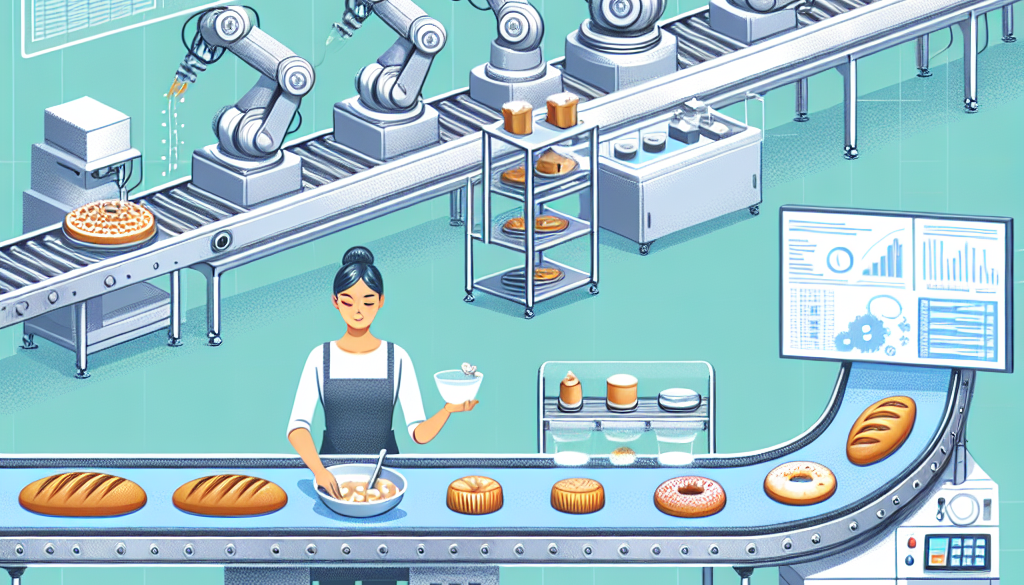Why Bakery and Food Automation is the New Norm?
-
Table of Contents
- Bakery and Food Automation: The New Industry Standard
- The Driving Forces Behind Food Automation
- Statistics Supporting the Shift to Automation
- Key Areas of Automation in the Food Industry
- Challenges and Considerations
- Case Studies: Success Stories of Automation
- The Future of Bakery and Food Automation
- Conclusion: Embracing the Inevitable Shift
- Discover ETprotein’s High-Quality Protein Products
Bakery and Food Automation: The New Industry Standard
The bakery and food production industries are undergoing a significant transformation, driven by the relentless pursuit of efficiency, consistency, and safety. Automation has emerged as a key player in this revolution, reshaping the way food is produced, packaged, and distributed. In this article, we delve into the reasons behind the rise of automation in the bakery and food sectors, exploring the benefits and the future implications of this technological shift.
The Driving Forces Behind Food Automation
Several factors contribute to the increasing adoption of automation in food production:
- Labour Shortages: The food industry often faces challenges in staffing, particularly in repetitive and physically demanding roles. Automation offers a solution to this by filling gaps in the workforce.
- Consistency and Quality Control: Automated systems ensure that products are made to exact specifications without human error, leading to consistent quality and customer satisfaction.
- Increased Production Capacity: Machines can work 24/7 without breaks, significantly increasing output and meeting growing consumer demand.
- Food Safety: Automation reduces the risk of contamination by minimizing human contact with food products.
- Cost Reduction: Over time, investing in automation can lead to savings on labour costs and reduce waste through precise ingredient handling.
Statistics Supporting the Shift to Automation
Recent studies and market analyses provide a quantitative look at the automation trend:
- A report by Meticulous Research states that the food automation industry is expected to grow at a CAGR of 9.5% from 2020 to 2027.
- According to a survey by PMMI Business Intelligence, 50% of food manufacturers are planning to increase their level of automation within the next three to five years.
- The Global Food Robotics Market is anticipated to reach USD 3.1 billion by 2025, as per a Grand View Research report.
Key Areas of Automation in the Food Industry
Automation is being implemented across various stages of food production:
- Ingredient Handling and Mixing: Automated systems precisely measure and mix ingredients, ensuring consistency in taste and texture.
- Forming and Shaping: Machines can shape dough and other food items more quickly and uniformly than human hands.
- Baking and Cooking: Automated ovens and cookers control temperatures and cooking times for optimal results.
- Packaging: Robotics and conveyor systems streamline the packaging process, from wrapping to boxing.
- Inspection and Quality Control: Advanced vision systems and sensors detect imperfections or contaminants to ensure product quality.
Challenges and Considerations
While automation offers numerous advantages, there are challenges to consider:
- Initial Investment: The upfront cost of automation technology can be significant, though it pays off in the long run.
- Technical Expertise: Skilled personnel are required to operate and maintain sophisticated automated systems.
- Job Displacement: There is a concern that automation could lead to job losses, although it also creates new opportunities in tech and maintenance.
Case Studies: Success Stories of Automation
Many companies have successfully integrated automation into their operations:
- A large-scale bakery reduced its packaging time by 70% after implementing robotic packaging systems.
- A food processing company increased its production yield by 20% through the use of automated sorting and grading equipment.
The Future of Bakery and Food Automation
The future of food automation is bright, with continuous advancements in robotics, AI, and machine learning. Innovations such as 3D food printing and autonomous delivery vehicles are on the horizon, promising to further revolutionize the industry.
Conclusion: Embracing the Inevitable Shift
Automation in the bakery and food industry is not just a fleeting trend; it’s a strategic move towards a more efficient, safe, and sustainable future. Companies that embrace this change will likely find themselves at a competitive advantage, able to meet the demands of a growing and increasingly tech-savvy consumer base.
Discover ETprotein’s High-Quality Protein Products
As the food industry evolves with automation, the demand for high-quality ingredients continues to rise. ETprotein is at the forefront of supplying premium protein products that cater to the needs of automated food production. Their extensive range of organic, non-GMO, and allergen-free proteins, including their L-(+)-Ergothioneine (EGT), is ideal for businesses looking to enhance their food products with superior nutrition and taste.
About ETprotein:
ETprotein, a reputable protein and L-(+)-Ergothioneine (EGT) Chinese factory manufacturer and supplier, is renowned for producing, stocking, exporting, and delivering the highest quality organic bulk vegan proteins and L-(+)-Ergothioneine. They include Organic rice protein, clear rice protein, pea protein, clear pea protein, watermelon seed protein, pumpkin seed protein, sunflower seed protein, mung bean protein, peanut protein, and L-(+)-Ergothioneine EGT Pharmaceutical grade, L-(+)-Ergothioneine EGT food grade, L-(+)-Ergothioneine EGT cosmetic grade, L-(+)-Ergothioneine EGT reference grade and L-(+)-Ergothioneine EGT standard. Their offerings, characterized by a neutral taste, non-GMO, allergen-free attributes, with L-(+)-Ergothioneine purity over 98%, 99%, cater to a diverse range of industries. They serve nutraceutical, pharmaceutical, cosmeceutical, veterinary, as well as food and beverage finished product distributors, traders, and manufacturers across Europe, USA, Canada, Australia, Thailand, Japan, Korea, Brazil, and Chile, among others.
ETprotein specialization includes exporting and delivering tailor-made protein powder and finished nutritional supplements. Their extensive product range covers sectors like Food and Beverage, Sports Nutrition, Weight Management, Dietary Supplements, Health and Wellness Products, and Infant Formula, ensuring comprehensive solutions to meet all your protein needs.
As a trusted company by leading global food and beverage brands and Fortune 500 companies, ETprotein reinforces China’s reputation in the global arena. For more information or to sample their products, please contact them and email sales(at)ETprotein.com today.












